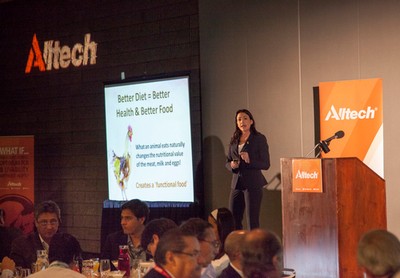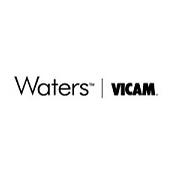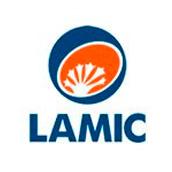Alltech IPPE breakfast: Feed flock today to benefit human health tomorrow
Published: January 29, 2015
Source : Alltech Mycotoxins
What if you could produce high quality, safe and delicious eggs and meat that also happen to be nutrient powerhouses for consumers? What if your premium eggs and meat tasted better than your competitors? What if your eggs and meat could assist in the learning ability of children, reduce cardiovascular disease and slow age-related mental decline?
Registered dietitian and human nutritionist, Nikki Putnam, posed these questions and more during Alltech’s annual breakfast at the International Production and Processing Expo (IPPE) on Wednesday, Jan. 28. Putnam spoke to more than 200 members of the poultry industry on opportunities to attain profitable growth while meeting a demanding consumer market through algae nutrition during her presentation, “What if a Nutrient Derived From The Sea Could Improve Both Animal and Human Health?”
Putnam, whose chief role with Alltech is to close the gap between human nutrition and animal production, asked the audience to consider if they know what their consumers want? A 2013 study by Sullivan Higdon & Sink Advertising and Marketing Agency found that 69 percent of consumers think it’s important to understand how their food is produced.

Photo caption: Registered dietitian and human nutritionist Nikki Putnam encouraged poultry industry members to keep the consumers’ health and wellness in mind when selling and marketing meat and eggs during her presentation at Alltech’s Annual Breakfast Meeting during IPPE.
“The health and wellness industry has exploded in the past five years, and continues to grow exponentially each year,” Putnam said. “Consumers are smart. They’ve learned to read labels. They’re learning to be skeptical of claims on packaging, and they’ve learned how to find anything they’d like to know about a food product, fad diet or disease online.”
One way producers can reach the consumer market is through functional foods. By enriching the animal’s diet with additional nutrients, such as DHA omega-3, naturally more nutrient-dense food products like meat, milk and eggs are created, without any off flavors, added ingredients or change in the quality or consistency of the food.
In addition to studies showing an improvement in birds’ immune health and bone strength, the active forms of essential omega fatty-acids, particularly DHA, in human diets play an important role during pregnancy and early infant development. High levels of dietary DHA are also associated with lower rates of cardiovascular disease, age-related mental decline and attention deficit disorder.
However, Putnam said the typical human dietary intake of DHA is falling short of the recommended 400 to 1,000 mg/d rate due to a worldwide fish and fish oil shortage and the potential for contaminants to enter in traditional autotrophic algae production. A renewable alternative to fish oil, heterotrophic algae is grown in an enclosed system and does not use sunlight so specific nutrients can be fed and intake can be controlled.
“Is food the new medicine? Why are we so DHA focused?” Putnam said. “Consumers at the supermarket are looking at price, nutrients, sustainability... but it all boils down to health. They are looking for the healthier option.”
In addition to the breakfast meeting and in keeping with Alltech’s focus on education, the Alltech Student Manuscript Award was presented to Kathryn Meloche, a poultry science student at theAuburnUniversity, who won the award with her paper, “Validation of Prediction Equations for Apparent Metabolizable Energy of Corn Distillers Dried Grains with Solubles in Broiler Chicks.” Menconi received a trophy and a $500 cash prize.
Source
Alltech MycotoxinsRecommend
Comment
Share

Would you like to discuss another topic? Create a new post to engage with experts in the community.




